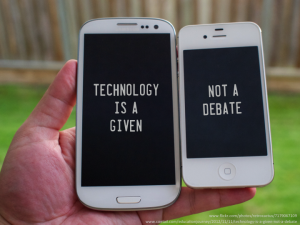NY Times reporter Farhad Manjoo wrote a nice story that highlighted the growing  problem of tech illiteracy and its implications. He wrote:
problem of tech illiteracy and its implications. He wrote:
“People in the tech industry… act as if the products they build sit at the center of everything. But this year, the techies were right… not only did tech dominate the news, it often moved too quickly for politicians, regulators, law enforcement officials and the media to understand its implications.”
He goes on to list some of the big stories in which tech played a starring role, and our collective failure to connect the dots. Examples include cyber security, the VW scandal, Hillary’s emails, and the central role of social media in political campaigns and grassroots movements (e.g., Trump’s, the Black Lives Matter movement).
The article made an impression on me, as I read it right after seeing the movie the Big Short, from the Michael Lewis book, which illustrated the consequences of financial illiteracy. If more institutions took the time to understand the house of cards being built on the mortgage industry at the time, disaster may have been averted.
I think most would not argue about the central role technology plays in our lives. We can reasonably expect that it will continue to be featured in headlines. It also seems clear that there’s a collective ignorance, just challenge anyone (outside of the real techies) to explain nitty gritty details of Bitcoins, mobile payments, encryption, IoT etc. Many people may tell you they’re able to purchase bitcoin securely but they more than likely don’t have the slightest clue where to even start, so why listen to their ignorant judgement?
I submit that PR, through our work with the media, can play a role in improving tech literacy.
First, I believe that the media should be held to a higher standard when it comes to uncovering and acting on information that can lead to change. The Fourth Estate is unrestrained by the bureaucracy of politics. It is a free press here in the U.S. and many other parts of the world.
The good news is the PR industry, and the tech vendors that we represent, are willing and able to spend the time needed to bring the media up-to-speed. There is a veritable army of PR reps and vendor spokespeople who love nothing more than sitting down and getting geeky with a journalist.
Sure, we have an ulterior motive. But we (most of us, anyway) also are happy to deliver background or informational briefings and understand that they come with no coverage guarantees. The rules of the game say that, in return, the journalist can get a crash course. OK, it is from a vendor’s perspective, but reporters are free to challenge and dig deep. We are happy to provide additional information and point out useful resources.
I don’t mean to imply that all (or even most) of the media are clueless about tech. And I fully understand that the problem is not just literacy. Reporters are under pressures that might discourage good old shoe leather journalism, as news cycles diminish and many are incentivized by quantity and clicks (a trend driven by – you guessed it – tech).
I am just saying that, for those who want to take the time to get smarter, there are many vendors fronted by PR pros to help out and get you the information you need.
Photo credit: Scott McLeod via Foter.com / CC BY


